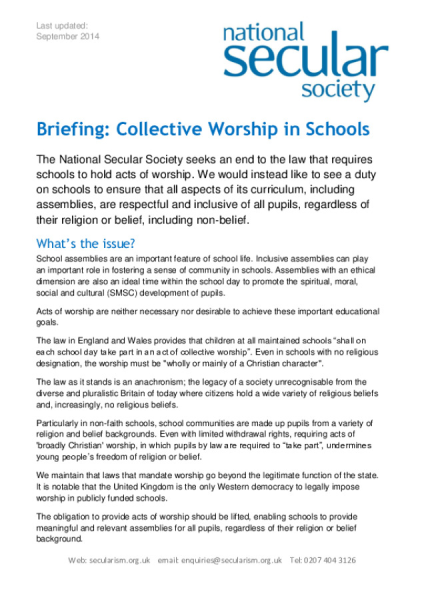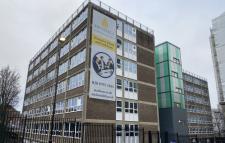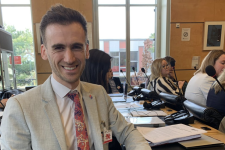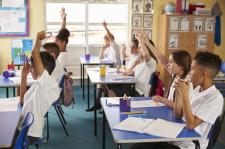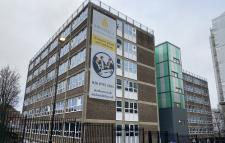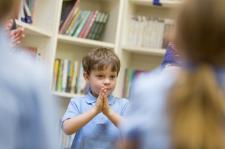Collective Worship
The National Secular Society seeks an end to the law that requires schools to hold acts of worship. We would instead like to see a duty on schools to ensure that all aspects of its curriculum, including assemblies, are respectful and inclusive of all pupils, regardless of their religion or belief, including non-belief.
School assemblies are an important feature of school life. Inclusive assemblies can play an important role in fostering a sense of community in schools. Assemblies with an ethical dimension are also an ideal time within the school day to promote the spiritual, moral, social and cultural development of pupils.
Acts of worship are neither necessary or desirable to achieve these important educational goals.
The law in England and Wales provides that children at all maintained schools "shall on each school day take part in an act of collective worship". Even in schools with no religious designation, the worship must be "wholly or mainly of a Christian character".
The law as it stands is an anachronism; the legacy of a society unrecognisable from the diverse and pluralistic Britain of today where citizens hold a wide variety of religious beliefs, and increasingly, no religious beliefs.
Particularly in non-faith schools, school communities are made up pupils from a variety of religion and belief backgrounds. Even with limited withdrawal rights, requiring acts of 'broadly Christian' worship, in which pupils by law are required to "take part", undermines young people's freedom of religion or belief.
We maintain that laws that mandate worship go beyond the legitimate function of the state. It is notable that the United Kingdom is the only Western democracy to legally impose worship in publicly funded schools.
We therefore campaign for the obligation on schools to provide acts of worship to be lifted, enabling them to provide meaningful and relevant assemblies for all pupils, regardless of their religion or belief background.
Find out more
Related News
School’s decision to restrict prayer rituals lawful, court finds
Posted: Tue, 16 Apr 2024 11:40
Disadvantage to Muslim pupils outweighed by need to promote interests of whole school community, judge says.
NSS address urges UN to call for government action on human rights
Posted: Thu, 14 Mar 2024 10:26
Religious privilege is undermining rights of UK citizens, NSS tells UN committee.
Protect human rights from religious imposition, NSS urges UN
Posted: Fri, 9 Feb 2024 13:38
NSS tells UN Human Rights Committee religious privilege is undermining rights in education, healthcare and around free speech.
Remove religious barriers to inclusion in NI schools, paper says
Posted: Tue, 30 Jan 2024 16:54
"Little change" in school religious composition for over two decades, research finds
Peer calls for more secular democracy in RE debate
Posted: Fri, 19 Jan 2024 15:37
Lord Warner challenges prayers in parliament and schools, bishops' bench, and faith schools.
Lives “endangered” at school which restricted prayer rituals
Posted: Thu, 18 Jan 2024 13:41
NSS calls for government action after school subjected to death threats and bomb scares.
NSS highlights religious barriers to inclusive education in NI
Posted: Mon, 15 Jan 2024 14:12
NSS response to inquiry calls for more integrated schools and more secular education system in Northern Ireland.
School “misleading” parents on plan to join CofE academy trust
Posted: Fri, 6 Oct 2023 08:26
Primary school fails to tell parents academy trust is run by Church of England and all its schools are faith schools.
Church plans to use schools to drive conversion of children
Posted: Tue, 4 Jul 2023 12:04
The Church of England has unveiled plans to use schools to drive recruitment of children and young people to Christianity.
In a document published on Friday, the Church said "courageous structural shifts in thinking and practice in education" will "contribute to the Church's vision to double the number of children and young people who are active Christian disciples by 2030".
The Church, which is embroiled in safeguarding scandals, has seen a dramatic decrease in membership, particularly among young people. The 2019 British Social Attitudes survey found just one per cent of 18-24 year olds in Britain belong to the CofE. Overall, less than 1% of adults in England regularly attend CofE services.
Education "central to the mission of the wider diocese"
The document recommends government leaders "further deepen the mutual partnership between church and state, at national, regional and local level, to enable the ongoing flourishing of church schools for coming generations".
It calls for dioceses to "provide an ambitious and expansive vision" for the role of the Church in education. This includes "the creation of new models of church in schools, which provide opportunities for children and adults to develop their journey of faith, through well planned pathways to discipleship".
"By creating and embedding strategic partnerships between churches and schools across the diocese, children, young people and their families can have the opportunity to grow in faith," it says.
It says diocesan leaders should ensure education is "central to the mission of the wider diocese", and should pay particular regard to religious education and collective worship.
The document says the Church's vision for education is "not just for Church schools" and that the Church will "continue to embrace vibrant partnerships with all major education institutions".
It adds that the Church "has a particular responsibility" to "safeguard the distinctive vision of its schools".
It also says school trust leaders should "celebrate equity, diversity, belonging, inclusion and justice". But many Church of England schools' admissions policies discriminate against children whose families do not belong to the Church. Research in 217 found one in four dioceses advise their schools to reserve some places on faith grounds. In 2013, the Fair Admissions Campaign found Church of England comprehensives whose admissions criteria allow full selection of faith admit 35% fewer children eligible for free school meals.
The Church has also been criticised recently for its homophobic and sexist policies.
Last month the UN Committee on the Rights of the Child (CRC) urged the UK to repeal compulsory collective worship laws and end the religious selection practised in faith schools.
NSS: 'Church regards our schools as mission fields'
National Secular Society head of campaigns Megan Manson said: "The Church has made it clear that it regards our education system as a mission field. Its latest plans reveal it wants to cynically use the state education system, which citizens of all faiths and beliefs pay for, to boost its plunging membership figures.
"Its desire to form even deeper links to the state can only further undermine secular democracy.
"These plans are highly inappropriate in such a diverse society, where Christians are now a minority.
"The government should stop giving the Church a free hand to pursue its own self-serving agenda in publicly funded schools. The purpose of such schools should be to educate, rather than inculcate pupils into a particular faith.
"And it should work separate Church and state rather than further entrench these ties."
End faith-based selection in schools, UN committee urges
Posted: Wed, 7 Jun 2023 12:03
Schools in England should be prevented from religious discrimination in their admissions, a United Nations committee has said.
The UN Committee on the Rights of the Child (CRC) also recommended repealing compulsory collective worship in schools and the parental right of withdrawal from sex education.
The recommendations were made in the CRC's concluding observations, published today, on the most recent periodic reports of child rights in the UK.
The National Secular Society welcomed these recommendations, which it has raised with the UN repeatedly for many years.
Discrimination in faith schools
The CRC urged the UK to "guarantee the right of all children to freedom of expression and to practise freely their religion or belief", including by "preventing the use of religion as a selection criterion for school admissions in England".
Most types of faith schools in England have exemptions from the Equality Act 2010, which enable them to prioritise children from families who share their faith if they are oversubscribed.
This can include requiring parents and children to regularly attend a local place of worship or provide evidence of baptism.
Many parents find that because they belong to no religion or a minority religion, they are unable to send their children to their local state school.
The NSS has long campaigned for the equality law exemptions for faith schools to be repealed.
The CRC also recommended "revising the education syllabus in Northern Ireland to include education on and respect for a diversity of religions".
Last year NI's High Court ruled that the country's religious education system breaches the European Convention on Human Rights due to its heavy Christian bias.
Compulsory collective worship
The CRC recommended "repealing legal provisions for compulsory attendance in collective worship" in schools.
The law in England and Wales states that children at all maintained schools "shall on each school day take part in an act of collective worship". Northern Ireland and Scotland have similar laws. Even in schools with no religious designation, the worship must be "wholly or mainly of a Christian character". The UK is the only Western democracy which legally imposes worship in publicly funded schools.
The NSS has long called for collective worship laws to be abolished because they breach children and families' freedom of religion or belief.
The committee said the UK should establish "statutory guidance to ensure the right of all children, including children under 16 years of age, to withdraw from religious classes without parental consent".
Children cannot currently withdraw themselves from collective worship until they reach Sixth Form.
The NI High Court also found NI's collective worship laws breach human rights.
Relationships and sex education
The CRC said "comprehensive, age-appropriate and evidence-based" sex education should be compulsory at all levels of education, including information on same-sex relationships and reproductive health rights. It said this should be "without the possibility for faith-based schools or parents to opt out of such education".
Parents in England, Scotland and NI can withdraw their children from sex education. While relationships and sex education is compulsory for all state schools in England, NI and Wales, faith schools may teach it from a religious perspective. NSS research in 2018 found this results in "distorted" sex education, including teaching adolescents that contraception and same-sex relationships are morally wrong. The CRC raised particular concern about discrimination against children who are LGBT.
NSS urges government to implement recommendation to make inclusive schools "a reality"
NSS head of campaigns Megan Manson said: "We welcome the UN Committee on the Rights of the Child's recommendation that faith-based selection at schools be abolished.
"As the UK becomes more irreligious and religiously-diverse, more parents are finding their children locked out of their local school, simply because they don't belong to the 'right' religion. It's disgraceful that such religious discrimination is permitted in the schools we all pay for.
"We also welcome the committee's recommendation to end compulsory collective worship. Compelling children to pray to gods they do not believe in has no place in schools.
"It's high time our entire education system was transformed into a secular, inclusive one which equally welcomes children from families of all religions and beliefs. We urge the government to implement the CRC's recommendations to make this a reality."
NOTES
Other CRC recommendations which the NSS has called for include:
- "Promptly and effectively" investigating and intervening in all cases of child abuse, including in religious institutions.
- Ensuring access for adolescent girls to "age-appropriate family planning services, affordable contraceptives and safe abortion and post-abortion care services", particularly in Northern Ireland.
- Developing strategies for eliminating child marriage, female genital mutilation and 'honour' violence.
- Ending "conversion therapy" of children.
- Improving education about children's human rights among children and teachers.

